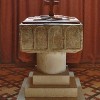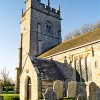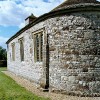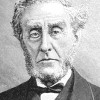He was a smuggler, as was his father before him. He flouted the law of his day, yet always managed to present a façade of respectability. Isaac Gulliver, it has been said, was “the gentle smuggler” the Raffles of the Hanoverian duty-free culture; an audacious genius of an illicit occupation.
In the 18th century the Napoleonic wars forced the price of continental wheat and liquor to a prohibitive level for the poor. As journeymen’s wages were also very low there was a great incentive for many men and some women to smuggle as a means to supplement a meagre income. Since agricultural wages were typically only 3s to 6s a week the prospect of making 10s a night by smuggling proved irresistible. Venturers were often in league with captains and were regularly running the risk from or confrontation with excise officers or “Preventive Men”, as they were sometimes known.
But Gulliver was in a league of his own regarding his resourcefulness in the lengths he could – and did – go to give customs the slip on at least three occasions. He is said to have had himself carried through the streets of Poole in a barrel. On another occasion he even feigned death by whiting his face with chalk and lying in an open coffin while excise officers were raiding the house he was in.
Little however is known about Gulliver’s early life in the Wiltshire border village of Seamington near Melksham where he was born on September 5th 1745, the son of a man himself actively involved in smuggling in the Poole area. At this time Bournemouth as a developed resort did not exist, and the narrow wooded valleys (chines) which ran down to the shore were ideal for concealing un-shipped contraband. Coy Pond at Westbourne was a popular rendezvous for smugglers, and Gulliver’s father. And later Isaac himself regularly used this and Branksome Chine for concealing their offloaded cargoes.
When Isaac was 19 in 1765, his father made a will. By this time his son possessed a strong physique and constitution, and had begun to follow in his father’s footsteps. 1765 saw him in collaboration with Robert Trotman, another smuggler who was shot dead in mysterious circumstances on the Poole shore, causing suspicion to be cast upon Gulliver as the possible murderer on the night in question. But as with so many of the other accusations which were to follow in the years to come, Gulliver’s possible complicity in the killing could not be proved. He was also said to have been implicated in a confrontation between 40 smugglers and 6 dragoons at about this time, which resulted in the outlaws’ horses being stolen. Trotman was buried in Kinson Churchyard.
By the time his daughters had arrived Isaac was in league with William Beale and Roger Ridout. Running much contraband on the shore between Poole and Christchurch. As his wealth from smuggling accrued, Gulliver was in a position to enter into property speculation and investment on a grand scale, as well as being a moneylender for mortgaging.
In 1775 for instance, Gulliver bought Pitts Farm and other properties and lands in the Kinson area. Prior to this he also held land at Cudsell and Ensbury and had styled himself as a wine merchant and innkeeper at Thorney Down. Between 1775 and 1783 he bought Eggardon farm from the Revd. William Chafin and had sub-let 75 acres of land at Kinson while living at the King’s Arms for a while as a tenant. In 1783 he sub-let the shop he ran as a winery at Kinson.
The same period also witnessed notable incidents arising from the smuggling operations on the coast. In 1777 a man called Levi Payne stole Gulliver’s 10 year-old grey horse and £21.16s collected on his behalf. In response Gulliver, who was living at Thorney Down at the time, advertised a handsome reward for the return of his property. But in 1778 he offered 10 guineas as a bounty and 5 guineas “to drink the King’s health” to any young men who were prepared to serve in the Navy or Army. December 1779 found Gulliver boarding at the White Hart in Longham while he was selling off some horses.
A few months later customs officers raided a granary thought to have been near the Dolphin Inn at Kinson. 541 gallons of brandy and rum, with 1,871 lbs. of raw coffee were seized from J. Singer, one of Gulliver’s servants. Then in 1782 Gulliver’s name appeared on a customs list for un-shipping 4 pipes (480 gallons) of wine without payment of duty. About four years earlier the King’s Commissioners for Customs in London asked their counterparts in Poole for a report on Gulliver’s activities, but for neither of these indictments were the authorities able to make any charge stick.
But there were few who did not benefit from Gulliver’s activities. The gentry were directly or indirectly the recipients of his imports. And by 1780 Gulliver had established a network of distribution points as far west as Lyme Regis. He also had a force of about 10 men in his service, called “Whitewigs” after the distinctive uniforms of white coiffures and smocks, which they wore.
The broad, solid redbrick and cobble tower of Kinson Church has a band of dripstones around it which today are worn and chipped, but the damage is not due solely to time and the elements. It was caused by knocks from kegs of liquor being winched up the tower, probably under cover of darkness by Gulliver’s men during the heyday of Dorset smuggling.
Gulliver even planted trees on the ancient Eggardon Hillfort to act as a landmark for the luggers making for the coast with their cargoes. Then the contraband would be landed at West Bay, Swyre or Bexington. The Preventive Men were well aware of the activities of Gulliver and his cahorts, but virtually no action was ever taken to curb them. Possibly a certain amount of bribery went on to account for this, but the smugglers had to be caught in the act to be arrested and charged.
In 1784 customs raided a barn at Kinson, generally believed to have been at Pitt Farm, which Gulliver had ought from Mary Barnes. Another tenant of Mary’s was John Potter, whose wife Hannah was questioned by the officers at the Dolphin Inn.
In 1788 Gulliver put his Kinson home up to let and by the following year he was living at West Moors. Three years later he was at West Parley, where he is noted for bringing an injunction against the unlawful removal of the Hampreston/Parley parish boundary marker. But in the 1790’s he moves to Long Crichel to lead a quieter life.
In 1796 Gulliver’s second daughter Ann married Edmund Wagge of Burton House, but found herself a widow after only three years. Gulliver himself was to experience a family tragedy when in November 1798 at the age of only 24 his son Isaac died and was buried at Wimborne. Gulliver officially retired in 1800 but an 1867 edition of the local paper The Poole Pilot carried a story that at the turn of the century Gulliver had landed a record amount of contraband from three luggers anchored near Bournemouth Pier.
The year 1815 saw the Gullivers settled at Kinson House (now superseded by modern flats) and the retired smuggler entering into a legal agreement for a cottage in Kinson to which was attached an ancient enclosure called Le Cocqs, situated behind the Kinson Baths. Gulliver’s daughter Elizabeth, who had married a respectable Wimborne banker, called William Fryer, made her marital home at Pelham House. In 1822 Gulliver was awarded a deed of land at Bourne Farm, Canford, but could scarcely have lived to enjoy it. Ominously, on Friday, 13th of September that year, he died and was interred in Wimborne Minster. The Canford Award revealed that he owned or leased over 390 acres in the Kinson area. His 12,000-word will revealed that he also held extensive property in Wiltshire, Hampshire and Somerset.
(See our story Sixpenny Handley, published 26th November 2012 in Sixpenny Handley category.)



